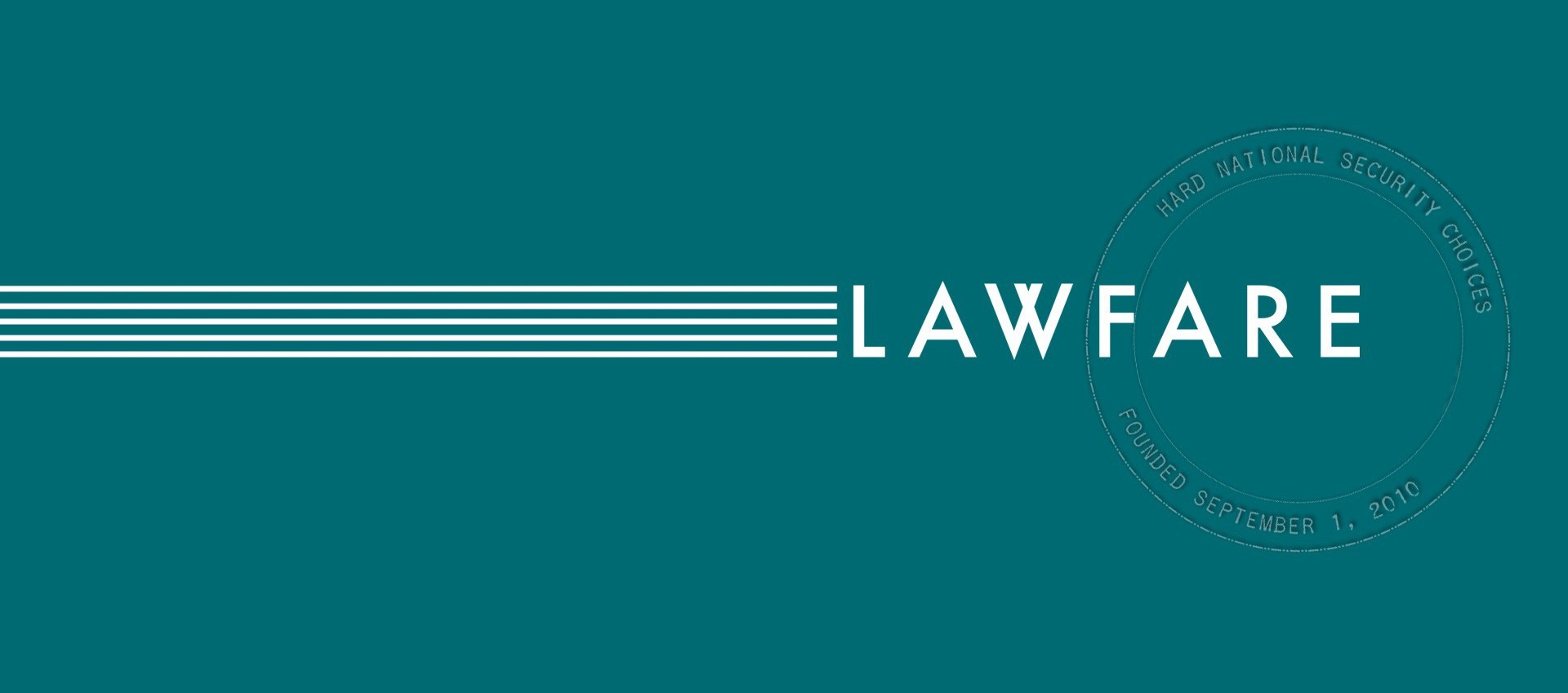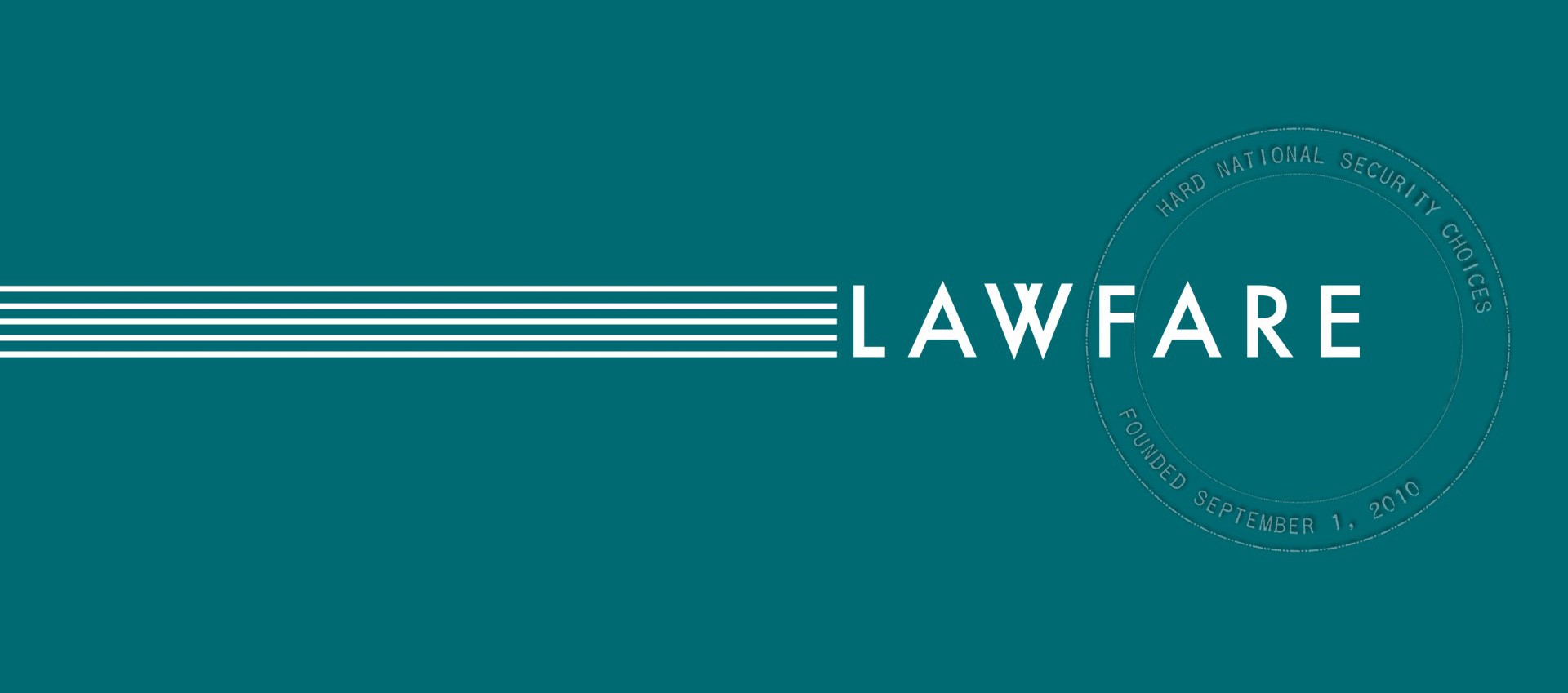Carrie Cordero On the FAA Reauthorization
Carrie Cordero, Georgetown's Director of National Security Studies and a former Justice Department official, writes in with the following account of a recent Cato Institute event (which, ahem, would have been on the Lawfare calendar and the good folks at Cato notified us about it, by the way) on reauthorization of the FISA Amendments Act:
On July 25 the Cato Institute held a panel event entitled The Surve
Published by The Lawfare Institute
in Cooperation With

Carrie Cordero, Georgetown's Director of National Security Studies and a former Justice Department official, writes in with the following account of a recent Cato Institute event (which, ahem, would have been on the Lawfare calendar and the good folks at Cato notified us about it, by the way) on reauthorization of the FISA Amendments Act:
On July 25 the Cato Institute held a panel event entitled The Surveillance Iceberg: The FISA Amendments Act and Mass Spying without Accountability. The panel featured Sen. Ron Wyden (D-OR), Eric Lichtblau of the New York Times, Michelle Richardson of the ACLU, and was moderated by Cato Research Fellow Julian Sanchez. The event provided a forum for Sen. Wyden to spend about 45 minutes outlining his reasons for recently placing a hold on the reauthorization of the FISA Amendments Act of 2008 (FAA), which currently sunsets on December 31. Since at least the summer of 2011, he and Senator Mark Udall (D-CO), who is also a member of the Senate Select Committee on Intelligence (SSCI), have been pushing the Intelligence Community to provide more public information about how the FAA works, and how it affects the privacy rights of Americans. In particular, they have, in a series of letters, requested that the Executive Branch provide an estimate of the number of Americans incidentally intercepted during the course of FAA surveillance. According to the exchanges of letters, the Executive Branch has repeatedly denied the request, on the basis that: i) it would be an unreasonable burden on the workforce (and, presumably, would take intelligence professionals off their national security mission); and ii) gathering the data the senators are requesting would, in and of itself, violate privacy rights of Americans. The workforce argument, even if true, is, of course, a loser. The question of whether the data call itself would violate privacy rights is a more interesting one. Multiple oversight personnel independent of the operational and analytical wings of the Intelligence Community – including the Office of Management and Budget, the NSA Inspector General, and just last month, the Inspector General of the Intelligence Community, have all said that the data call requested by the senators is not feasible. The other members of the SSCI appear to accept this claim on its face. Meanwhile, Senator Wyden states he just finds the claim unbelievable. That there must be some way it can be done, he says, if even on a sample basis. Maintaining that position puts him in an interesting place, however: is the privacy advocate actually advocating for violating the privacy rules, to appease a Congressional request? Assuming that he would not actually want to advocate that the rules be waived at the request of a politician, a question then arises as to whether the Intelligence Community has adequately explained exactly how the data call would work and why it would conflict with existing privacy rules and protections, such as minimization procedures. Public disclosure and a re-airing of the 2007 and 2008 FAA debates seem more likely to be what he is after. Just last week, the Office of the Director of National Intelligence (ODNI) declassified, at the Senator’s request, three statements concerning FAA compliance. As stated in the ODNI’s July 20 letter to Senator Wyden, the three statements that were declassified are:Concerned that the above three statements would be taken out of context, the ODNI also included the following statement in their letter:
- A recent unclassified report noted that the Foreign Intelligence Surveillance Court has repeatedly held that collection carried out pursuant to the FISA Section 702 minimization procedures used by the government is reasonable under the Fourth Amendment.
- It is also true that on at least one occasion the Foreign Intelligence Surveillance Court held that some collection carried out pursuant to the Section 702 minimization procedures used by the government was unreasonable under the Fourth Amendment.
- I [Senator Wyden] believe that the government’s implementation of Section 702 of FISA has sometimes circumvented the spirit of the law, and on at least one occasion the FISA Court has reached this same conclusion.
Meanwhile, the assertion of today’s program’s title that the FAA enables “mass spying without accountability,” is debunked by the SSCI’s own report issued on June 7. The intelligence committees have been on the receiving end of a mountain of reports describing FAA activities, the FISA Court’s reviews, and the Executive Branch’s own compliance reviews. The SSCI report, and the additional written views of Senator Feinstein (D-CA), the Committee’s Chair, states that the statutorily-mandated reporting requirements “provide the Committee with extensive visibility into the application of…minimization procedures,” and have enabled the Committee to conduct “extensive” and “robust” oversight. The report goes on to detail all of the different categories of reports and briefings that have been provided to the Committee to facilitate their oversight role, in accordance with the National Security Act of 1947, as amended. Probably the most realistic prediction of today’s panel was that of ACLU’s Michelle Richardson, who speculated that Congress will quietly reauthorize the FAA in the lame duck session after the November election.
- The government has remedied these concerns and the FISC has continued to approve the collection as consistent with the statute and reasonable under the Fourth Amendment.
Benjamin Wittes is editor in chief of Lawfare and a Senior Fellow in Governance Studies at the Brookings Institution. He is the author of several books.




